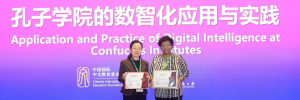
Confucius Institute at Stellenbosch University Receives Recognition for Excellence in Digital Application and Practice
- CISU received two awards at the 2025 World Chinese Language Conference for outstanding digital innovation, with one project recognised as a Demonstration Case and another as a Finalist Case.
- The awarded projects showcased successful digital strategies, including viral short-video community engagement for a high school Chinese club and a portable-projector teaching model that improved access to multimedia learning in resource-limited schools.
- These achievements highlight CISU’s leadership in digital transformation within international Chinese education and its growing impact on innovative teaching, cultural exchange, and scalable, technology-driven practices.
On 16 November, the First Confucius Institute Digital Application and Practice Case Selection Awards Ceremony took place during the 2025 World Chinese Language Conference in Beijing. The Confucius Institute at Stellenbosch University (CISU) in South Africa received two awards in recognition of its innovative digital practices. CISU’s two submitted cases — “Community Operations + Short Video Communication: How the Stellenbosch High School Chinese Club Went Viral” and “A Lightweight Model for Chinese Teaching and Cultural Activities via Portable Projectors: A South African Practice” — were recognized as a Demonstration Case and a Finalist Case, respectively. These awards highlight CISU’s active engagement and creative capacity in advancing digital innovation in international Chinese education.
During the ceremony, Prof Zheng Ruojuan, Chinese Director of the CISU, and Mrs. Carmien Snyman, Assistant Director of Stellenbosch University International Operations, accepted the awards on behalf of the institute. Jointly initiated by the Chinese International Education Foundation and the University of Science and Technology Beijing, the selection aims to showcase exemplary digital practices in teaching, cultural exchange, and institutional management across Confucius Institutes worldwide. Submitted cases were evaluated under three themes: Smart Teaching, Smart Cultural Exchange, and Smart Management. Outstanding cases will be included in the 2025 Collection of Confucius Institute Digital Application and Practice Cases for broader global dissemination. CISU’s achievement reflects the broader transformation of international Chinese education, where digital tools are reshaping teaching and cultural engagement while advancing the vision that “Digital Innovation Creates Value; Intelligence Shapes the Future.”
The Demonstration Case, “Community Operations + Short Video Communication: How the Stellenbosch High School Chinese Club Went Viral,” was led by CISU-dispatched teacher Mr. Zuo Liugang. Designed around the interests and learning motivations of South African secondary students, the project leveraged WhatsApp community management and short-video dissemination to expand the club’s visibility and influence rapidly. Operating with zero budget and a low technical threshold, the club grew from 6 to 61 registered members in just two months — an increase of more than 917%. Short videos documenting cultural workshops, traditional attire experiences, and creative activities accumulated over 100,000 views and were reposted multiple times by the school’s official social media accounts, creating a communication loop that extended from the online community into the school campus and beyond. Interactive elements, including a “Best Model Award,” encouraged active student participation and nurtured local “micro-influencers,” offering a scalable and replicable model for promoting Chinese language learning in resource-constrained educational environments.
The Finalist Case, “A Lightweight Model for Chinese Teaching and Cultural Activities via Portable Projectors — A South African Practice,” was developed and implemented by CISU-dispatched teacher Ms. Zhou Jingchen. The project addresses the lack of fixed multimedia equipment and the related property-safety concerns in many South African schools by introducing portable projectors to create mobile, low-cost, and immersive learning environments. The model shifts classroom instruction from traditional board-centered teaching to interactive projection, touch-enabled tabletop activities, and multimedia-supported cultural immersion. This approach has been effectively applied in Chinese language instruction, calligraphy and tea-culture workshops, guzheng demonstrations, martial arts classes, and various community cultural activities. It has since been adopted by multiple Confucius Classrooms and partner teaching sites, reaching more than one thousand learners and demonstrating the potential of digital tools to enhance language instruction and cross-cultural engagement.
The dual recognition of these cases reflects CISU’s sustained commitment to digital transformation and its ongoing contribution to educational cooperation between China and South Africa. Looking ahead, the Institute will continue to advance digital empowerment in international Chinese education, further enrich its short-video communication ecosystem, and explore scalable models suited to regions with limited educational resources —ensuring that technology continues to enhance language learning and deepen cultural understanding.
